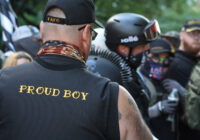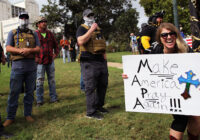As protests continue to bring cities across the United States to a standstill, the problem of racist policing is more evident than ever before. The killing of George Floyd at the hands of the Minneapolis Police Department was the latest in a long line of violent assaults on people of color by law enforcement, and his name joins an ever-growing list of those who have been killed by ones who are sworn to protect and serve. The United States is grappling with the issue of police racism before the world’s eyes, and the scale of the conversation currently happening is unprecedented and, sadly, still not enough.
While the unconscious bias of some officers of the law has been laid bare for all to see, the conscious and hateful bias of others has remained largely in the shadows. The systemic issue of racial profiling is evident, but the hidden epidemic of far-right activism in police departments around the country is an insidious and even more dangerous threat. The links between the police and organized racism are as old as the institutions themselves. During the civil rights movement, Southern police chiefs coordinated with local Ku Klux Klan chapters, and many officers and commissioners in the deep South were accused of aiding Klan activity and even being active members of KKK organizations.
Investigating the Radical Right’s Presence in the Military
While this trend seems like an archaic symptom of the era of segregation, links between law enforcement and far-right organizations have remained constant through the 20th century and into the 21st and are now seemingly more widespread than ever. In the 1990s, a federal judge found that a number of deputies in the Los Angeles County Sheriff’s Office had concrete links to neo-Nazi organizations and that a number of cases of police violence against black and Latino communities had been motivated by their racist hostility and “terrorist” sympathies. Likewise, in 2008, a prominent Chicago-area police officer was fired and prosecuted over links to the Ku Klux Klan.
Widespread Infiltration
A 2015 FBI investigation found that white supremacist infiltration of law enforcement agencies was at epidemic levels, and suggested that right-wing and anti-government “domestic terrorists” were using links with law enforcement to gain intelligence and restricted access privileges, as well as ultimately evade capture. The report found that the vast majority of law enforcement agencies across the United States did not screen potential recruits for links to far-right organizations and often turned a blind eye to those recruits with questionable political beliefs.
The bureau was aware of widespread infiltration as early as 2006, suggesting in a heavily redacted report that white supremacist activists were taking advantage of weak vetting procedures in local law enforcement agencies to gain access to “restricted areas vulnerable to sabotage and to elected officials or protected persons, whom they could see as potential targets for violence.” The 2006 report suggested that this was a systematic effort, coordinated by high-profile far-right figures such as William Pierce, and infiltration was seen as a key element in the philosophy of leaderless resistance.
Despite the concerns and recommendations outlined in the FBI’s latest report, recent research has shown that the links between law enforcement and the extreme right have continued to flourish. Last year, a Reveal News investigation found that hundreds of active duty and retired law enforcement officers were members of online forums dedicated to Islamophobia, neo-Confederate ideology and even neo-Nazism. Almost 400 police officers from 150 different departments had their identities verified, and many were found to have been actively peddling hate speech, anti-Semitic conspiracy theories and anti-government rhetoric.
The Proud Boys in particular have strong links to law enforcement, and a number of high-profile investigations have highlighted the extent of the collusion between police and the hate group described as the “alt-right fight club.” In May this year, a Chicago PD officer, Robert Bakker, was found to have been an active member of a Proud Boys Telegram channel called “Fuck Antifa,” where he actively coordinated Proud Boys meet-ups and bragged about his connections in the police department and the government.
Six months earlier, a police officer from East Hampton, Connecticut, was forced into retirement after his links to Proud Boys groups in the area. The Lawyers’ Committee for Civil Rights Under Law led an investigation into the officer’s social media activity, finding that he was an active member of the self-described “western chauvinist” group. A year before that, a female officer from Clark County, Washington, was fired after she was pictured wearing a Proud Boys sweatshirt and was later discovered to have been merchandising Proud Boys apparel on the design-sharing RedBubble website.
Even in cases in which officers are not active members of hate groups, collusion remains a very real issue. In 2019, police officers in Washington, DC, were pictured fist-bumping Proud Boys members at a July 4 rally in front of the White House. The members of the group were then given a police escort to a local bar, while anti-fascist protesters were met with violence from both the police and the Proud Boys. In an even more egregious case, an investigation in Portland, Oregon, found that a senior police officer had been exchanging friendly text messages with Joey Gibson. Gibson was the leader of the far-right Patriot Prayer, a sometimes violent offshoot of the Proud Boys defined by both the Anti-Defamation League and the Southern Poverty Law Center as a hate group.
In the lead-up to a number of high-profile clashes between the group and anti-fascist counterdemonstrators, Gibson and Lieutenant Jeff Niiya shared joking messages and talked about Patriot Prayer’s planned actions, with Niiya even confiding in Gibson that he had told officers to ignore outstanding warrants for the arrest of a prominent Patriot Prayer member, Tusitala “Tiny” Toese. A separate investigation found that Niiya had submitted police reports on Gibson’s behalf, launching criminal investigations against “antifa activists” based on footage Gibson had privately sent him. This raised concerns that far-right demonstrators were being given preferential treatment by Portland police, particularly given the reputation for forceful suppression of anti-fascist counterprotest in the city.
Not Immune
Although this trend reaches uniquely epidemic levels in the United States, the rest of the world is not immune. A 2019 report showed alarming levels of collusion between law enforcement and violent right-wing extremists in Germany. The investigation, led by the nation’s general prosecutor, found that the extreme-right Nordkreuz group had compiled a death list of leftist activists, journalists and pro-refugee targets using police records and was in the process of planning a major terror attack. It was found that the 30 members of the group had close ties to law enforcement, with at least one member actively employed by a special commando unit of the state office of criminal investigations.
A recent investigation by Der Spiegel found that the elite unit, known as the KSK, openly tolerated extremist right-wing iconography and membership, even using widely-known Nazi ciphers such as “88” — code for HH, or Heil Hitler. The investigation uncovered high-level officers openly promoting “national-conservative ideology” and espousing racist ultranationalism. Earlier this year, a KSK soldier who reportedly had links to extremist groups was arrested after a weapons and explosives cache was found in his back yard. The German government responded to Der Spiegel’s exposé by launching its own investigation into the unit, finding that racist extremism was endemic across all ranks. As a result, the unit was officially disbanded in early July.
As historian Kathleen Belew has shown in her most recent book on the long history of the far right’s links to the United States military, “Bring the War Home: The White Power Movement and Paramilitary America,” the siphoning of weaponry and ammunition from military bases to white supremacist organizations has been a constant tactic of would-be terrorist groups. There is no doubt that the continued militarization of police forces in the United States and Europe, combined with the high levels of extremist infiltration, offers new avenues for the theft of high-grade weaponry and tactics, and further armament of extremist right-wing groups.
These links between law enforcement and white supremacist organizations are deeply concerning, and present a very real threat to peace, justice and liberty in the United States and around the world. As police racism once again enters the spotlight, it is more important than ever to examine and challenge the infiltration of law enforcement by racist extremists. A centralized vetting process that directly seeks out links to organized racism and excludes candidates with any affiliation with far-right groups is the bare minimum and should be the first step toward a total overhaul of the training and oversight procedures.
Despite a number of legal challenges to the protective role of policing, law enforcement, at its core, still exists to protect and serve the people regardless of race, religion or creed, and any affiliation with hateful ideology compromises an officer’s ability to execute this role fairly and without prejudice. Until the systemic and personal racism of law enforcement is no longer an issue, we will see more George Floyds, more Breonna Taylors, more murders in the name of law and order. Preventing and eliminating racist bias in police departments across the US is only the first step toward a long process of reckoning and reconciliation.
*[Fair Observer is a media partner of the Centre for Analysis of the Radical Right.]
The views expressed in this article are the author’s own and do not necessarily reflect Fair Observer’s editorial policy.
Support Fair Observer
We rely on your support for our independence, diversity and quality.
For more than 10 years, Fair Observer has been free, fair and independent. No billionaire owns us, no advertisers control us. We are a reader-supported nonprofit. Unlike many other publications, we keep our content free for readers regardless of where they live or whether they can afford to pay. We have no paywalls and no ads.
In the post-truth era of fake news, echo chambers and filter bubbles, we publish a plurality of perspectives from around the world. Anyone can publish with us, but everyone goes through a rigorous editorial process. So, you get fact-checked, well-reasoned content instead of noise.
We publish 2,500+ voices from 90+ countries. We also conduct education and training programs
on subjects ranging from digital media and journalism to writing and critical thinking. This
doesn’t come cheap. Servers, editors, trainers and web developers cost
money.
Please consider supporting us on a regular basis as a recurring donor or a
sustaining member.
Will you support FO’s journalism?
We rely on your support for our independence, diversity and quality.






